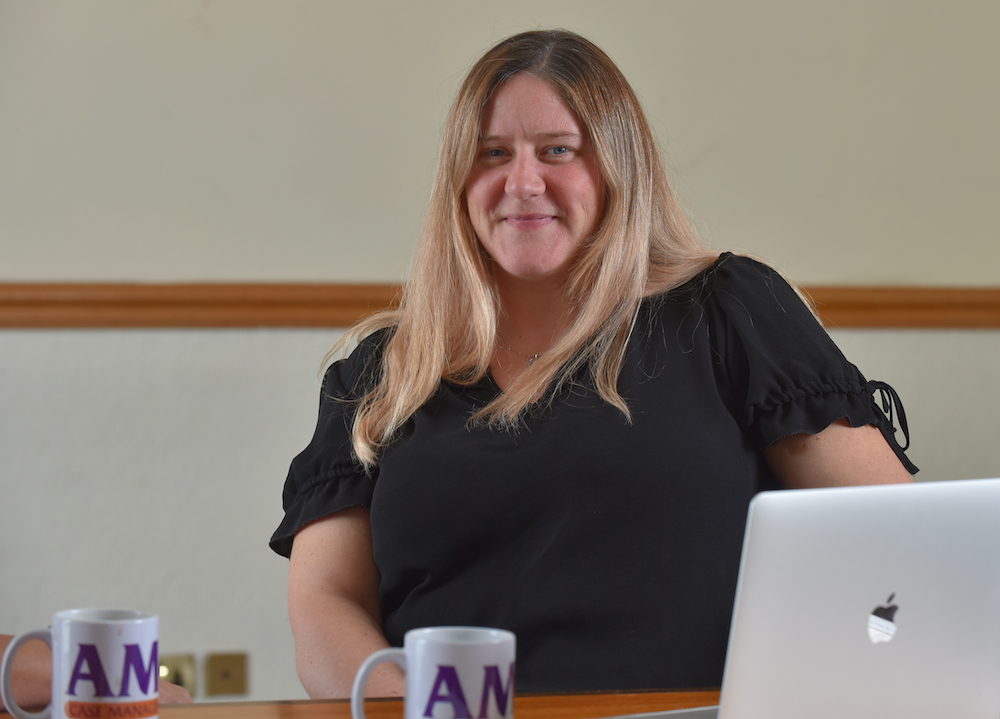
From once not considering that case management could be for him, Alan Salles is now using his award-winning care worker experience to support clients as an associate lead case manager at PsychWorks Associates.
Here, Alan tells NR Times how his background in hands-on care and academic achievement – combined with his personal experience and motivation – makes him the case manager he is today
While Alan Salles did not pursue the traditional clinical route into case management, his unique assets and skillset are helping him to set a new route for success in the field.
With a background of over 15 years in hands-on care and support work, an uncompromising dedication to clients, and an outstanding academic track record, with qualifications from the University of Cambridge and UCL – Alan is bringing a fresh approach to case management.
Having moved to the UK from Brazil aged 19, he has embraced every opportunity that has come his way; combining part-time work in care with his studies, he built up experience and expertise both professionally and academically.
Quickly moving through the ranks from support worker to team leader, Alan also won a national Specialist Carer of the Year Award from Ceretas (now Homecare Association) for his commitment to clients and the selfless dedication he gave to his work. He has since become an associate case manager with PsychWorks Associates, using his degree in psychology to add to their unique psychology-led team approach.
And his personal experience has also proved to be key to the person and case manager he is today. Alan – who grew up with an older brother with cognitive disabilities – was diagnosed with testicular cancer aged only 25. Thankfully, he beat the disease, but credits that experience as helping to shape him personally and professionally.
“I think every life experience helps shape our professional work, and vice versa, as in our professional experience helps to shape our life events,” says Alan.
“At that point in my life, I got some insight into what it is like to be in the position of clients I have helped, when something quite catastrophic happens overnight and you have to adjust and deal with it.
“But I have always believed that if something happens to you, good or bad, it is an opportunity to review, learn and reflect. And that is central to what I do in my work and my life.”
Becoming a case manager via the care route
Having moved to the UK as a young student who spoke little English, Alan adopted what he calls the “immigrant mentality” of finding as many opportunities as possible to build his career and life in his new home country.
Initially working in the kitchen of an elderly care home, Alan realised how much he loved interacting with the residents. From there, he successfully applied for a support worker role, which meant he could now deliver the care help that they needed.
 “I’ve always had such a soft spot for elderly people that I just loved it, to the point that I would spend more time outside talking to the clients than actually in the kitchen doing work,” he recalls.
“I’ve always had such a soft spot for elderly people that I just loved it, to the point that I would spend more time outside talking to the clients than actually in the kitchen doing work,” he recalls.
“I’d spend every minute I could be outside talking to the residents and engaging with them, so my move into support work felt very organic. I had no experience at all, but the care manager at that time decided to give me a chance. And that’s how it started.”
From there, Alan progressed to working with people living with dementia in the care home, and then became a brain injury support worker, supporting people in the community across North London. One of his first appointments was to support a client on a neuro-rehab placement in The Wellington.
“I found it really amazing to be able to see people at such an early stage of their recovery – and that was pretty much a springboard for everything else I did afterwards,” he says.
“I was working with clients with so many different circumstances, across brain injury, mental health, learning disabilities and spinal cord injury. I loved working with the clients, it felt like the right job for me.”
Throughout his time building a career in support work, Alan was also committed to studying, learning as much about the academic and theoretical side of healthcare to support his practical work.
Over the years, Alan’s vast achievement has seen him gain degrees in psychology from Birkbeck College; international relations from the University of Cambridge; health and social care management from Bucks University; and a Master of Science in global health development from UCL.
“I have never been the average person who has one job at a time. I was discovering this passion about the health and social care industry and how I could use my professionalised view of the work to make a difference,” he says.
Having worked extensively in team leader roles, Alan was well aware of what case management was – but it was only when he met case manager Dr Shabnam Berry-Khan in 2011 that he believed it could be for him.
“I thought Shabnam was spectacular, and she kept telling me about what she did as a case manager and that she thought I could do it too,” says Alan.
“Shabnam saw me for who I am and the skills I have. I complemented her senior professional health worker skills, which ultimately covered the depth and breadth of need for most of the catastrophically-injured clients we would encounter.”
Having joined Dr Berry-Khan when she established her own case management venture in 2017 – which has since joined as the case management wing of her thriving treating psychology service, PsychWorks Associates – Alan was the first member of her team of associates, and is now their associate lead case manager.
As well as being able to make an impact as a BABICM case manager, he has also found an outlet for his psychology background, perfectly knitting together his expertise into one unique role.
While Alan confesses that even to this day he is occasionally made to feel like a ‘second-class citizen’ by some in case management, he is pleased with the contribution and difference he is making to IDTs and clients’ lives.
“It’s about the ability to communicate and solve problems, and I have the hands-on experience of doing that – that is so important when you need to be able to get the care team on side,” he says.
“When we have meetings with people in the IDT who don’t have the experience of seeing it from the care team’s perspective, I can sit down with them and say, ‘Instead of this, why don’t we do X, Y and Z?’ Because I know what works, I have done it as a support worker and I can imagine how the information will be received and more surely embedded.”
Keen to encourage others from a care background into case management, Alan believes such a move could have a hugely positive impact on the profession – especially with CQC clearly emphasising the importance of safe recruitment, which is based on drawing out and aligning values.
“It would be lovely to see more people from a care background getting into case management,” says Alan.
“There is a role for care-trained people who are genuinely passionate about person-centred care, who can see the bigger picture from a clinical and compliance stance, and pull it all together in a collaborative way. You can really tailor the care to the client’s needs, more than you can in a standard care setting.
“For someone who is genuinely excited about person-centred care, as I am, I’d say case management is absolutely a route to look at.”
Personal experiences underpinning outstanding client service
With a warm and engaging personality and a reflective approach, Alan is naturally suited to working in such a client-focused role. But his own personal experiences have been key in his commitment to selflessly supporting clients.
Having grown up with a brother who has lived with cognitive disabilities since birth, Alan has always been aware of brain injury and what support looks like.
“I never really knew anything different, it was completely hardwired in me,” he says.
“I saw in my own family the importance of helping people, and that you can’t live your life without helping people. If I can’t be a positive influence in someone’s life, then I’d better not be part of it – that’s how I feel, and that is why I want to make a positive difference to the lives of my clients.”
Alan’s own devastating diagnosis with cancer has also been significant, and continues to inspire him to maximise the support for clients.
“I say it was the best and worst experience of my life. I had some insight into being a patient, looking at the other side of helping, and I think that really helped me to understand things a lot more. I was now the patient who was needing support,” he recalls.
“But I see it as a rewarding experience, because I could use it as an opportunity to improve myself. My psychology background was useful here, because it gives you the adaptability to continuously reflect. I could use my cancer as an opportunity to look at what I could take out of the experience that would be helpful, how can I grow as a person?”
While his life experience has helped to influence him in the long-term, even in the short-term, while undergoing chemotherapy, Alan’s dedication to clients continued.
“The company I worked for at the time was great, they said work if you want, don’t if you don’t. But I had one client who I had developed a really good relationship with, and he was moving back home, he was all alone,” says Alan.
“I remember it would take me an hour and a half to walk a distance that would previously have taken me maybe 15 minutes, it would take me the whole day to go and see him, but it really helped him – and I think it helped me as well, to know I was still making a difference.
“There is always so much richness in working with people with brain injury, what you learn, how it inspires you to do more. My time as a patient helped to show me, to some extent, what care and support means to the individual. I saw that myself, and that’s why I love what I do and the difference I can make.”
The PsychWorks Associates difference
At PsychWorks Associates, his differences are seen as huge positives in delivering support to its multicultural and diverse client base.
“From the first time I met Shabnam, I knew she was a person I could engage with,” says Alan.
“She saw me for who I am, she treated me as me. And as an immigrant, that’s something that’s always in the back of our minds, feeling not as good as other people and being treated as such.
“But she was the first person who validated me for who I am, for the skills I have and the work I do. Everything made sense when I met Shabnam, and I would not be where I am had I not met her.
“Her approach to me the first time I met her runs throughout the business. People are treated who they are, for their own unique qualities and skills. There is also a humility that comes from Shabnam which is very hard to find, and that is such a positive quality that runs through PsychWorks Associates too.
“I think my background is also a very positive thing, and works really well for our clients in London in particular because that is such a diverse mix. It is very important that we have a diverse and inclusive workforce, it works very well for us and for society as a whole. After all, diversity exists in our client base and we want representation for them too.”
The opportunity to use his psychology background is again something that is welcomed by PsychWorks Associates – something few other case management businesses count among their services.
“Our psychology gives us an adaptability, the opportunities to continuously reflect, which is very important for us as professionals,” says Alan.
“I wasn’t quite sure where that could come in, but alongside my hands-on experience and professional background, it has been the best possible match for me.
“What we do with clients is rewarding in so many ways – and I am so pleased to have this opportunity to do it with such a special organisation.”
Kate Dobson, business manager at PsychWorks Associates, adds: “Alan is such an asset to our service, for all the reasons that emerge when you get him talking about case management.
“We’re currently expanding both our case management and treating psychology associate teams for injured clients in and around London. If someone feels that these roles in a supportive service like PsychWorks Associates really appeal to them, we do invite them to get in touch via www.psychworks.org.uk/jobs”.









